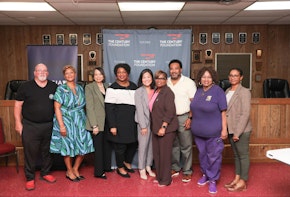In February 2023, COVID-19 test manufacturer Abbott Laboratories laid off at least 750 workers in Maine.1 The number of laid off workers could be as high as 1,000, but it is hard to quantify, as most of the workers’ employers of record were temporary agencies. Nearly all of these workers were people of color, many of whom were immigrants who fled unrest back home, and many of whom spoke French or Lingala, but not English and hailed from a wide variety of nations in Central and Southern Africa.2 Other workers included in the layoffs were from Cambodian, Vietnamese, Latin American, Afghan, Haitian, and Somali communities. Mass layoffs in a community are always difficult, but this particular case, in which hundreds of workers were laid off in an unfamiliar place where they have not had the time or resources to learn the language—at the tail end of a global pandemic that had already isolated people and strained public resources—is exponentially worse. These were workers who kept everyone else safe during the pandemic, but were then cast to the side, often laid off by their temp agencies via text message without even a full day’s notice.
This report explores the Maine Department of Labor’s (MDOL) remarkable response to this layoff through collaboration with the Peer Workforce Navigator project—a coalition of community-based organizations in partnership with the MDOL—which made a huge difference in the lives of these laid off workers. The report also examines aspects of the state’s unemployment insurance (UI) system that might be improved to account for similar situations in the future.
Maine’s Peer Workforce Navigator Project
In responding to the mass layoff at Abbott Labs, the Maine Department of Labor (MDOL) worked closely with the Peer Workforce Navigator system to engage navigators in five organizations to dramatically improve what otherwise would have been catastrophic outcomes for the laid off workers. The Peer Workforce Navigator project consists of a partnership between five organizations: the Maine AFL–CIO, Maine Equal Justice, Prosperity Maine, Gateway Community Services Maine, and Food AND Medicine. The Peer Workforce Navigators kicked into gear quickly after receiving hundreds of inquiries the week that the layoffs occurred.
The idea of establishing a network of workforce navigators springs from findings that union members are more than twice as likely as nonmembers to apply for and receive unemployment insurance.3 Spreading this improved outcome to all workers serves some obvious goals—more workers accessing this key lifeline is good for them, their families, and communities. But also, there is an upside for advocates who can be more effective in their advocacy by having the resources to reach farther into diverse communities and learn more about issues claimants face.
Originally funded by the state of Maine4 and later through a competitive grant through the U.S. Department of Labor,5 the Peer Workforce Navigator program kicked off in early 2022.
Observing the Peer Workforce Navigator Project in Action
On April 10 and 11, 2023, The Century Foundation—with help from the Peer Workforce Navigator project in identifying participants and providing space to meet—held focus group listening sessions in English, French, and Lingala with dozens of laid off workers as well as other community organizations working to serve these workers. The purpose of these focus groups was to learn where workers were experiencing difficulties with the unemployment insurance system and what the Maine Department of Labor could do differently to make sure workers got access to benefits. The planning for these focus groups started during the early days after the layoffs, when few workers had applied and both the MDOL and the navigators were concerned that workers may need additional resources or outreach in order to apply.
The MDOL has a long-standing practice of setting up rapid response sessions in the case of a major layoff event. These sessions provide workers with information about UI, health coverage options, training programs, and other community-provided services. Also, typically, at least one potential new employer is invited to these sessions and is encouraged to accept applications from and otherwise help claimants understand how they can best position themselves with future employers.
The first rapid response session after these layoffs were announced took place within days. Following that session, a calendar of future sessions was planned incorporating lessons learned from the first session—primarily that sessions should be divided by primary language spoken, as accommodating multiple languages in a single session made it less valuable than holding sessions with a single translation.
These sessions, in collaboration with the Peer Workforce Navigator project, also included three Maine UI agency staff who could take claims and could help connect claimants to translators who spoke the right language. It is notable that focus group participants in both the English and Lingala sessions reported no difficulty with language access with any communications or materials. Maine has been able to produce UI informational materials in ten languages. During these sessions, claimants are given a basic information sheet about UI before they begin to apply. Agency staff then take claims, with each application taking about an hour to complete. This is a good example of how the collaboration between the Peer Workforce Navigators and MDOL can institutionalize a helpful practice.
After workers participate in one of these rapid response sessions, there are continuing opportunities available to them. The Maine Career Center, a state agency that provides a variety of employment and training services to Maine residents, has open office hours on every Wednesday to help claimants with UI claims and provide services to help workers find new work or training opportunities. Prosperity Maine, a Peer Workforce Navigator nonprofit service organization that assists Maine’s immigrants and refugees, has similar sessions available on Fridays. A major benefit to the Peer Workforce Navigator project is the incredible cultural and language competency that they bring to this work. It is particularly helpful to have similar services available through a government agency and a community group, as workers may either prefer to go straight to a government actor, or may have anxiety around interacting directly with the government.
Findings from the Focus Groups
The primary takeaway after these listening sessions was that, by the time the sessions were held, claimants had a surprisingly adept understanding of unemployment insurance, and an overwhelming majority of claimants who came to these sessions had already applied. While there were some claimants who were still waiting for a determination, some of those claimants were still within the three-week window that federal authorities deem to be timely payment of benefits. Claimants in these sessions who had not received benefits largely were likely ineligible due to core program requirements that the worker needed to have established a base period of earnings (generally about one year). Other complaints claimants made about the program also refer to standard core requirements that are broadly similar nationally, such as concern that twenty-six weeks of benefits may not be enough for this large number of workers to find jobs in their community, leaving many to seek work elsewhere, often outside of Maine.
Below are the findings from the individual focus group listening sessions.
Community Partners
The first focus group featured a panel of community partners6 who spoke about their experience assisting claimants, and what their observations were. In general, they found claimants to be aware of unemployment insurance, especially work search requirements for weekly certification. However, awareness does not translate into confidence in working through all of the steps necessary to get a benefit, keep the benefit, and access services needed to get reemployed. Claimants need assistance through all of the steps, and it is best if that assistance can be found all in one place, delivered through one trusted entity.
The community partners raised an issue that people in other focus groups echoed with regard to the pandemic. The claimants who have been around since 2020 have memories of accessing unemployment benefits at the height of the pandemic and had similar expectations about what their 2023 experience would be. Some claimants confused UI with the automatic stimulus checks, while others either waited months for a benefit in 2020 or were unsuccessful in obtaining benefits then, so did not bother to apply in 2023. This legacy of massive delays is not a problem unique to Maine—every state was overwhelmed with initial claims exceeding the highest initial claims in history by tenfold or more, while also setting up three new pandemic benefit programs authorized by Congress in March 2020. If states hope to ensure that the experience of 2020 does not color the public’s opinion of UI to the point of threatening its role as a macroeconomic stabilizer, a tremendous amount of outreach will continue to be necessary during mass layoff events. This includes humane treatment of claimants who were considered overpaid due to innocent mistakes made by agencies and claimants during the unprecedented surge in 2020.
Community partners reported that stigma was a common theme among claimants. Some workers do not want to be seen as reliant on public benefits. This is generally the case whenever the federal government does non-filer surveys. Many claimants prioritized work search and waited to apply for UI until they realized that they were unable to find a suitable replacement job. These claimants were now turning to UI to buy them the time to engage with training and other services to find a better match in terms of employment.
Community partners report that having information in claimants’ native language helped not just with program understanding, but also with the sense of the program being something that claimants were entitled to. Having multiple opportunities for claimants all in one place also helped claimants access the range of possibilities available to them. Advocates estimate that immediately after layoff, about 30 percent of workers were interested in UI and 70 percent were not. By April, those positions flipped, and instead 70 percent of workers were interested in UI, and 30 percent were reluctant. Some of this can be attributable to better language access, having UI and reemployment services in one place, and the incredible outreach efforts both from navigators and the MDOL.
Community partners reported that word of mouth was key to flipping this sentiment. Once some members of the community started receiving benefits, trusted messengers in the community would share information with peers over means such as passing information through families and in informal gatherings.
Some community partners recommended that improvements such as posting a clear explanation of the entire process from becoming unemployed to reemployment would not only help claimants to better understand the program, but also boost their confidence in navigating the system and future employment options. Partners also said work needs to be done educating the employer community about the value these workers provide, because cultural differences around work search—such as the U.S. reliance on resumes demonstrating work history—are creating hurdles for many communities. Employers are also not always aware of or confident enough in work authorization documents to effectively hire people with such documentation.
Claimants Who Did Not Apply
The first worker panel was for French-speaking workers who did not apply for UI, but by the time the panel convened, many participants had changed their minds and applied for benefits. The most striking thing about this panel was the level of education and previous experience these workers had. One worker was previously the financial director of a bank in Congo, another had a masters degree in economics and was a sales manager back home. All of them had significant work experience. Members of this group were particularly vexed by the fact that employers in the United States can lay off workers at any point, without notice, and even without cause. They reported that learning about the unstable nature of employment in the United States was quite disconcerting and destabilizing in general. As with many of the challenges workers raised during these focus groups, the solutions to their concerns were frequently far larger than the UI system could address.
Many panelists expressed frustration with Maine’s General Assistance program, which is intended to provide necessities for residents who do not have the resources to get them on their own. While the assistance helped claimants make ends meet, they said they felt rushed by the program to take the first available job rather than develop English skills and find work closer to what they were accustomed to doing. It should be noted that many states lack any flexible type of supports program like this at all, which would further exacerbate the rush for workers in such states to accept any offer of employment.
The non-filer panel reinforced the observation from the community partners focus group that their experience during the height of the pandemic shaped their understanding of the program. One worker had received partial UI (a reduced benefit for workers whose hours are reduced) at a previous job, so had a good understanding of the program. Others were not able to access benefits in 2020 and assumed they would have a similar experience if they applied again, so eschewed applying and instead were concentrating their efforts on finding new work.
A few members of the non-filer panel were unlikely to be eligible for UI, as they had not been in the United States long enough to establish a base period. One panelist was in training to be a certified nursing assistant (CNA) and was told they were not eligible for UI for that reason. One of the claimants had, at that time, applied four weeks earlier but had yet to receive a determination.
The non-filer panel had some suggestions that they believed would make the program better. One panelist suggested providing assistance for claimants working to start a small business, similar to the Self-Employment Assistance program that a handful of states offer. Panelists also said that it was often difficult to get through to the phone line, so it would be helpful to find a way to ensure calls are answered, or to institute a way for claimants to set a callback time. They also said they found the job fairs helpful and suggested having more of them.
French-Speaking Claimants Who Applied
The second focus group panel was French-speaking workers who had applied for benefits. The overall theme expressed by these workers was thankfulness. One claimant reported that both she and her husband were laid off from Abbott, and they had two children and she was seven months pregnant with her third child. They had no idea how they were going to survive, but the UI benefits came through on time and they were just enough to make ends meet. Another claimant reported that the temp agency that had connected her to Abbott informed her about UI eligibility and set up a Zoom meeting to provide further information. She still had difficulty with the process, but was able to get the help she needed from Prosperity Maine, a Peer Workforce Navigator partner, to qualify. Another claimant got help from Catholic Charities and the Career Center.
The members of this panel were concerned about the length of time it took to get benefits, but when pressed about their wait, it was generally about two to three weeks, which meets acceptable levels of performance standards. However, one panelist reported that his wife was still waiting to hear back after three weeks, and one claimant had applied about two months earlier and had not heard back. This claimant has yet to receive benefits as of June 2023, per an update from navigators.
The biggest concern this group presented was challenges finding new work. Multiple participants reported applying for several jobs per week and not hearing back. Some felt their limited English proficiency was playing a role in this challenge, while others thought that their lack of success had more to do with having worked at Abbott, as the pay there was relatively high for the area and kind of work. Given this lack of available work, multiple participants expressed concern that twenty-six weeks might not be enough time for them to find new work, despite searching full time.
The need for opportunities for English-language training was also raised by members of this group. One participant was a college professor before coming to the United States but had not had the time to learn English while working full time soon after arriving. With many countries to choose from, he came to the United States with the belief that he would have greater opportunities. Work authorization was also a major issue for members of this panel both in job seeking and also maintaining work authorization long enough to find replacement work. For this reason, the Peer Workforce Navigators have been advocating for greater employer education on work authorization.
One poignant point that came through from members of this panel was their concern for their children, particularly their mental well being. Part of the reason that these workers were working so hard to find replacement work was not only to provide for their children, but also so that they would not see their parents struggling. Some form of this concern came up in each of the worker groups, but was particularly prevalent in this group.
This group was more focused on the level of complexity in the application process than other groups. A couple of claimants said that it was a simple process for the state to tax them, but when they needed assistance, it was a quite difficult process. While individuals in Maine do not directly pay into UI, this perspective is still important to report so that policymakers fully understand how claimants view the program. One claimant said “Sometimes they don’t hear you, it’s very busy, you have to wait even days to talk with someone. When you call, you have to be patient and call every time. Sometimes it may take two days before you can connect with someone.”
Lingala Speakers—Filers and Non-Filers
The final focus group was with Lingala speakers who may or may not have applied for UI. As with the other panels, there was a high general awareness of what UI was, and claimants heavily stressed their perceived need to look for work weekly. While some claimants learned about UI through word of mouth in their community, others got information from community partners such as Catholic Charities, who have gotten trainings from recognized navigators. Still others attended the state’s rapid response sessions or job fairs. One claimant was referred to the MDOL after applying for SNAP benefits at the Maine Department of Health and Human Services. (This kind of interagency referral is an excellent best practice that should be replicated in more states.)
The panelists in this group, in general, seemed to tend toward telling positive stories about their experience. As was true with the other groups, panelists reported long wait times on the phone. However, when they came in person to either a community navigator or the Career Center, they were able to apply. Also, once they got through on the phone, they reported having few language difficulties. Occasionally, they were unable to get help in Lingala, but many claimants were bilingual and thus able to access benefits using their second language.
Members of this panel also expressed concern over the wait for benefits to be paid after the initial claim filing, which was typically two to three weeks. It should be noted here that federal acceptable levels of performance consider a payment within two or three weeks to be considered timely.7 During that period of uncertainty, they wanted to know what they could be doing to check on claim status or otherwise make ends meet until they began receiving benefits. Five of the participants had not gotten benefits they applied for as of the focus group, one had been waiting two months. One claimant did not realize she had been approved until she checked her debit card balance.
The panelists in this group also said they had difficulty with work search, both with looking for jobs generally and with reporting to the state. One issue they identified was providing a contact person and a phone number for potential employers identified during a search, when some of the ways that claimants sought work included reporting to locations where they may be able to pick up day labor, or other less formal search activities. Multiple members of this panel, as with the other panels, reported making extraordinary efforts to find new work but felt discriminated against because their primary language was not English. This issue came up repeatedly as a major concern for claimants. As with all the panels, “I just want to work” was a common refrain. Also similar to the French-speaking panel, there was widespread concern that twenty-six weeks of benefits wouldn’t provide them with enough time to find work. Because of the difficulty in job seeking either due to being unable to find work that paid as well as Abbott or limited English proficiency, multiple claimants in this panel said that they were considering leaving Maine, as they knew other people in their community had relocated and had an easier time finding work. They reported getting good information from the Career Center, but said that it was not leading them to work.
Finally, members of this panel were concerned about the level of income replacement that UI provides. Rent is high in Portland, and often a claimant’s entire UI benefit was not enough to cover rent. Some participants reported they had combined households with others, but did not feel that was sustainable.
Conclusion
By the time listening sessions were held in April, Maine Department of Labor and Peer Workforce Navigators had significantly helped claimants learn about and successfully apply for UI. One claimant was so happy about the impact UI had made in her life that she ended the session with a heartfelt “I love you” in English, spurring other participants to make the same exclamation. The primary takeaway is that when a state agency and community groups decide to come together and help laid-off workers, they can make enormous headway. The combination of rapid response efforts, job fairs, and walk-in clinics at both the Career Center and Peer Workforce Navigator partners all informed claimants of their rights in an effective way and provided support to a community that needed the intervention.
As far as challenges or suggestions that are within the Maine UI agency’s control, there are three main issues. First, claimants felt they would benefit from having up front more detailed, step-by-step instructions about the process and what to expect. They also felt the agency should consider reviewing its communications for clarity and eliminating complexity. Second, either state UI call centers could be staffed up during mass layoffs, or Maine could work to find ways to prioritize calls, and when call volumes are exceptionally high, provide a way for claimants to get a callback when volume ebbs. Employers could be better educated about work permit issues, and in ways to employ best practices in cultural literacy and translation. The level of effort put forth in translation was indeed heroic, but should be the norm for states prior to a crisis and could continue to evolve. Finally, since language barriers were identified as a major hurdle, and claimants expressed a desire to learn English to find more suitable work, the state should create a path for UI recipients to engage in ESL classes along with job search assistance unique to this population.
Most of the concerns raised by panelists, and the biggest concerns, are outside of MDOL’s control. Given the repeated concern that claimants were earnestly looking for but unable to find work, and the worry that twenty-six weeks might not sustain their entire job search, policymakers in Maine and federally should consider automatic extensions of weeks of eligibility when a community faces a mass layoff. Far too often, communities that experience a facility closure or similar economic shock are unable to bounce back. It is worth considering applying federally proposed economic stabilizers at the community level, not just to the state unemployment level, or perhaps expressly to mass layoffs. Another major concern was with the replacement of prior income. However, it should be noted that Maine’s replacement rate is much higher than the national average, and is only surpassed by only one other state in the Northeast Region—New Jersey, which notably often has the top replacement rate in the United States. Again, this seems like an issue that the federal government should consider addressing in comprehensive UI reform, particularly for the lowest-income claimants.
Notes
- Ari Snider, “Abbott, maker of at-home COVID test, lays off hundreds of immigrant workers,” WBUR, February 09, 2023, https://www.wbur.org/news/2023/02/09/immigrant-workers-aid-abbott-covid.
- For information on the conflict they were fleeing, see “DR Congo emergency,” UNHCR, https://www.unhcr.org/emergencies/dr-congo-emergency.
- Alexander Hertel-Fernandez and Alix Gould-Werth, “Labor organizations and Unemployment Insurance: A virtuous circle supporting U.S. workers’ voices and reducing disparities in benefits,” Washington Center for Equitable Growth, October 9, 2020, https://equitablegrowth.org/labor-organizations-and-unemployment-insurance-a-virtuous-circle-supporting-u-s-workers-voices-and-reducing-disparities-in-benefits/.
- “Mills Administration Launches New Workforce Development Pilot Program to Connect Underserved Maine People to Jobs,” Maine Department of Labor, January 13, 2022, https://www.maine.gov/labor/news_events/article.shtml?id=6459299.
- “US Department of Labor Awards More Than $18m in Grants to Address Disparities in Delivery of Unemployment Benefits, Services in 7 States,” U.S. Department of Labor, news release, June 10, 2022, https://www.dol.gov/newsroom/releases/eta/eta20220610-0.
- This included immigrant rights organizations, Catholic Charities, and other workforce organizations such as Portland Adult Education and United Way.
- Federal acceptable levels of performance can be found here: https://oui.doleta.gov/unemploy/pdf/Core_Measures.pdf.










